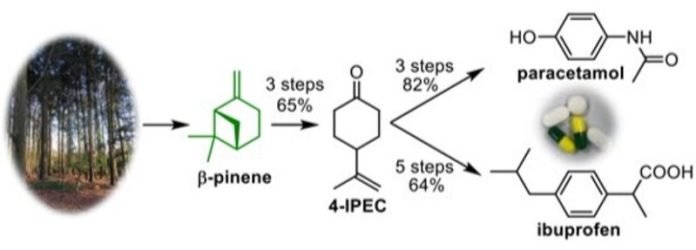
You might know pine trees for their characteristic smell and role in paper production, but researchers from the University of Bath have discovered a new, eco-friendly use for them.
They’ve figured out a way to make popular painkillers like paracetamol and ibuprofen from a compound found in pine trees.
This process could replace the current practice of making these medicines using chemicals from crude oil.
Crude oil is used more than you might think. It’s the starting point for creating a lot of medicines and other chemical products we use every day.
However, getting oil from the ground produces a lot of carbon dioxide, a gas that contributes to climate change.
Also, the price of oil can change a lot, and the world’s supply depends on the stability of the countries that have a lot of it. As the world tries to reduce its greenhouse gas emissions, finding alternatives to crude oil has become a pressing concern.
That’s where the scientists at the University of Bath step in.
They’ve discovered a way to make some common painkillers from a chemical called β-pinene, which is found in pine trees and is a leftover product from making paper. Pine trees produce more than 350,000 tons of this chemical every year, so there’s a lot of it available to be used.
The researchers have not only made paracetamol and ibuprofen, which are produced on a massive scale each year, but they’ve also created other chemicals used as the starting points for things like beta-blockers, a type of heart medication, and salbutamol, an asthma inhaler drug.
Some of these chemicals are also used in perfumes and cleaning products.
The team from the University of Bath describes their approach as a “biorefinery” model. Instead of using a large reactor to make separate batches of a product, this method uses something called a continuous flow reactor. This allows production to be uninterrupted, making it easier to increase the amount of medicine being made.
Dr. Josh Tibbetts, a scientist on the team, said, “Using oil to make pharmaceuticals is unsustainable… Instead of extracting more oil from the ground, we want to replace this in the future with a ‘bio-refinery’ model.”
Although this new process might cost more than the current oil-based method, the scientists believe people might be willing to pay a bit more for greener, plant-derived medicines. This breakthrough could be a big step forward for sustainable pharmaceuticals.
The details of this interesting research are published in the journal ChemSusChem.
So the next time you take a painkiller, consider that it could one day come from pine trees rather than crude oil!
Follow us on Twitter for more articles about this topic.



